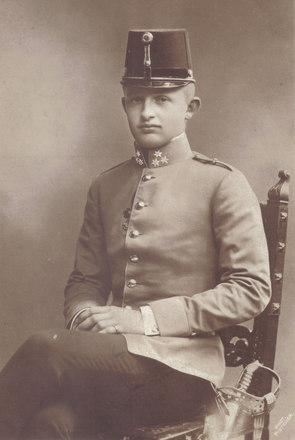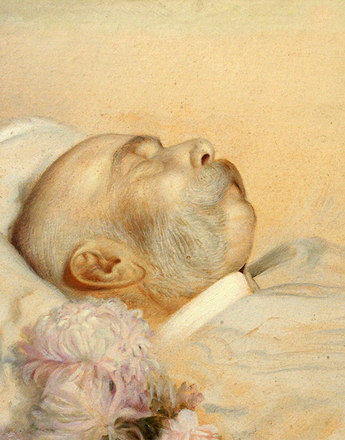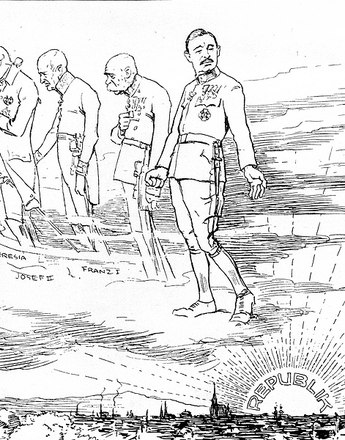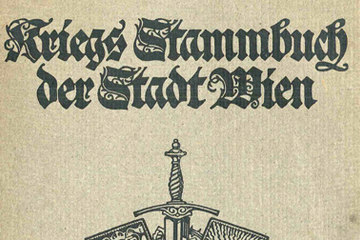Archduke Karl was thrust sooner than expected into the position of successor to the throne after the bullets of Sarajevo. Nevertheless, he was not at all included in the decision-making in July 1914 when the pros and cons of the war were discussed. This is astonishing, because the eventual death of the aged Franz Joseph had to be expected sooner rather than later – and Karl would also inherit the war along with the crown.
Until 1914 Karl had had the military career typical of a male member of the dynasty and spent several years in various garrisons in Bohemia and Galicia. Here he was taken aback by the attitude of the professional officers to their high-born “colleague” from the archducal house: the many Habsburgian archdukes with the rank of officer were treated with all proper respect and honours; internally, however, the archdukes were regarded as negligible supernumeraries who owed their brilliant careers solely to their high birth and not to individual achievements.
At the outbreak of the war the successor to the throne, as he was now, was appointed supreme commander, but with the express order not to get involved in direct combat for reasons of his safety. Karl fulfilled the tasks of a liaison officer between the Supreme Command and the Emperor in Vienna. He embarked on numerous inspection trips, taking the stage as representative of the dynasty and demonstrating its closeness to the army.
It was during this period that the problem of his relationship with the Chief of General Staff Conrad von Hötzendorf took root. The two had met briefly in pre-war days; Karl had served at the start of his career as a major in a regiment under Conrad’s leadership. In military affairs Karl was placed under Conrad, who acted with great reserve towards the crown prince in order to avoid any appearance of preferential treatment. It was an odd constellation, since it was obvious that the young archduke, still a subordinate officer, would become emperor in the near future. Karl accepted Conrad’s authority at first, and Conrad kept the young Habsburg out of the commissions most intimately involved in decision-making.
The plan for the successor to the throne as an observer without a large radius of effectiveness was that he become acquainted with the war from as global an angle as possible; thus he witnessed the failures of the Austrian Army on the Russian Front, when, at in late August 1914, the Russian troops broke through the front lines and started a successful offensive towards Galicia.
It was only in July 1915 that Karl was ordered to Vienna and from then on was initiated in the internal affairs of the Government at the side of Franz Joseph, so to speak at the last minute, since the old emperor’s state of health was rapidly deteriorating. The actual power of decision however lay in the hands of the top-brass military and the heads of the administration. The old emperor had been reduced to a purely symbolic figure, sheltered from the public and scarcely intervening in events. Karl, inspired with a sense of mission for the dynasty, saw his task however not in the fulfilment of empty honorary functions, but as a true “leader of his peoples”. Karl, though pursuing idealistic plans, did not avail of any political base and tensions built up between him and the old-established team of leaders surrounding Franz Joseph.
In August 1916 Karl then had himself deployed to the front again, after Romania had declared war on the Habsburg Monarchy and marched into Transylvania. He remained here only briefly, however; in November 1916 the successor to the throne was urgently called to Vienna because of the dramatically deteriorating health of the old emperor.
Translation: Abigail Prohaska
Brook-Shepherd, Gordon: Um Krone und Reich. Die Tragödie des letzten Habsburgerkaisers, Wien 1968
Broucek, Peter: Karl I. (IV.). Der politische Weg des letzten Herrschers der Donaumonarchie, Wien 1997
Demmerle, Eva: Kaiser Karl I. „Selig, die Frieden stiften …“. Die Biographie, Wien 2004
Gottsmann, Andreas (Hrsg.): Karl I. (IV.), der Erste Weltkrieg und das Ende der Donaumonarchie, Wien 2007
Leidinger, Hannes; Moritz, Verena; Schippler, Berndt: Schwarzbuch der Habsburger. Die unrühmliche Geschichte eines Herrscherhauses, 2. Auflage, Innsbruck, Wien 2010
Rauchensteiner, Manfried: Der Erste Weltkrieg und das Ende der Habsburgermonarchie 1914–1918, Wien u. a. 2013
-
Chapters
- Franz Joseph: the ageing emperor
- The problem of the succession
- Franz Joseph and Franz Ferdinand – a tense relationship
- Franz Ferdinand and his political programme
- Kaiser Wilhelm II: The Beloved Enemy
- “Archduke Bumbsti”
- Karl as successor to the throne
- The New Emperor
- Karl I and the collapse of the Monarchy
- The last days of the Monarchy
- Emperor Karl on his way into exile







